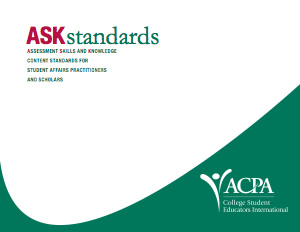 Use ASK intentionally as a basis to further develop your assessment knowledge and that of your staff. Endorsed by national accrediting bodies, associations, and assessment experts, the ACPA ASK Standards articulate the areas of assessment skills and knowledge (ASK) needed by student affairs professionals in all functional areas as well as by others. Use ASK to plan staff training or your own further development through ACPA eLearning courses, Webinars, State/International division conferences, and the annual ACPA assessment conference. ASK is your "what do I need to know?" professional development road map! ASK is a member service from the ACPA Commission for Assessment and Evaluation.
Use ASK intentionally as a basis to further develop your assessment knowledge and that of your staff. Endorsed by national accrediting bodies, associations, and assessment experts, the ACPA ASK Standards articulate the areas of assessment skills and knowledge (ASK) needed by student affairs professionals in all functional areas as well as by others. Use ASK to plan staff training or your own further development through ACPA eLearning courses, Webinars, State/International division conferences, and the annual ACPA assessment conference. ASK is your "what do I need to know?" professional development road map! ASK is a member service from the ACPA Commission for Assessment and Evaluation.
MEMBERS: DOWNLOAD THIS PUBLICATION FOR FREE (PDF)
List of ASK Contributors
- James Calliotte
- LuAnn Linson Coldwell
- Brian Dusbiber
- Edward Grandpre
- Gavin Henning
- Lane McFarland
- Alice A. Mitchell
- Becki Elkins Nesheim
- J. Worth Pickering
- Ryan Poirier
- Terrell L. Strayhorn
- Melinda Vann
- Stephen Zerwas
The Context for Assessment Skills and Knowledge Content Standards
Over the course of the past two decades, the public, legislative bodies, parents and students have shown increased interest in fiscal and learning accountability in higher education. Initiatives such as The Student Learning Imperative (American College Personnel Association, 1996), The National Study on Student Engagement (National Survey of Student Engagement, 2004), Learning Reconsidered (American College Personnel Association & National Association of Student Personnel Administrators, 2004), Greater Expectations (Association of American Colleges and Universities, 2002), the Measuring Up series (National Center for Public Policy and Higher Education, 2004), Declining by Degrees (Hersh & Merrow, 2005) and more recently College Learning for the New Global Community (Association of American Colleges and Universities, 2007) are examples of criticisms and higher education’s response to better identify and measure college outcomes.
In student affairs, the articulation and assessment of student learning has been especially challenging given the complex psychosocial and cognitive constructs that are the hallmarks of our work with students. Messy constructs such as leadership, citizenship, appreciation for diversity, critical and ethical judgement, and a host of interpersonal and intrapersonal intelligences present unique measurement issues. These constructs are found not only in student affairs but also in academic affairs where the constructs may include effective writing and speaking, team work, critical thinking and problem solving ability.
While student affairs graduates are taught basic research and assessment skills in their programs, many more seasoned professionals look to current publications and professional organizations such as ACPA assist them with the development of the skills and knowledge needed to successfully identify, measure, evaluate and articulate students’ co-curricular learning outcomes. Seminal works such as Assessment Practice in Student Affairs (Schuh, Upcraft, & Associates, 2001) and Assessment for Excellence (Astin, 1990) have helped to guide our work in this area.
While publications and other vehicles have been helpful, the ACPA Commission for Assessment for Student Development (CASD) notes that there is no agreement and no clear articulation of the content areas and proficiencies needed to successfully assess student learning outcomes in the co-curriculum. With this need in mind, the ACPA CASD invites you to engage in thought and dialog through The Assessment Skills and Knowledge (ASK) standards.
The ASK standards seek to articulate the areas of content knowledge, skill and dispositions that student affairs professionals need in order to perform as practitioner-scholars to assess the degree to which students are mastering the learning and development outcomes we intend as professionals. Consistent with language used in the context of educational accountability, these areas of knowledge and skill are termed “content standards.” Phrased conversationally, content standards describe “what you need to know.” That is, what do student affairs professionals need to know in order to do assessment?
Proficiency standards complement content standards. Proficiency standards articulate the degree of expertise of the practitioner in a given area of content. Again phrased conversationally, proficiency standards describe “how well do you know it; how well can you do it.” Phrased another way, how well do student affairs professionals know various areas of assessment skill and knowledge? The primary focus of this discussion paper is to identify the appropriate knowledge content areas all student affairs practitioners need in order to engage in meaningful and useful assessment. The identification of appropriate proficiency levels for each content area is outside the scope of this project. However, it follows that once content areas are established and generally agreed upon, a discussion of proficiency in each area will and should follow.
Developed in consultation with student affairs professionals from across the Association, the Assessment Skills and Knowledge (ASK) content areas are:
- Assessment Methods: Analysis
- Benchmarking
- Program Review and Evaluation
- Assessment Ethics
- Effective Reporting and Use of Results
- Politics of Assessment
- Assessment Education
- Assessment Design
- Articulating Learning and Development Outcomes
- Selection of Data Collection and Management Methods
- Assessment Instruments
- Surveys Used for Assessment Purposes
- Interviews and Focus Groups used for Assessment Purposes
